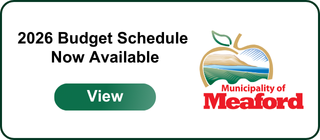By Stephen Vance, Editor
 The Municipality of Meaford has posted some pretty impressive waste diversion numbers over the last couple of years, and everyone in the community should be proud that our little municipality is currently ranked third of 223 municipalities in our efforts to shift waste from landfills to recycle stations and compost heaps.
The Municipality of Meaford has posted some pretty impressive waste diversion numbers over the last couple of years, and everyone in the community should be proud that our little municipality is currently ranked third of 223 municipalities in our efforts to shift waste from landfills to recycle stations and compost heaps.
Even more impressive is that of the 75 Ontario communities of comparable size to Meaford, we are in top spot for diverting waste.
More than 60 percent of the waste generated by our residents is now collected not in garbage bags or trash cans, but in blue boxes and green organics bins. That is quite an accomplishment, and now the municipality has their sights set on reaching a 70 percent diversion rate.
That too is a good thing. Meaford residents have responded well to the call for lessening the load on landfills.
However, if we think back to the original three Rs of waste management, while we may be doing a fabulous job in the “Re-use” and “Recycle” departments, the key to actual progress when it comes to managing the waste we generate is found in what is still the most overlooked of the three Rs – “Reduce.”
The fact is that while we may be diverting our waste from landfills, the energy and fuel resources required to collect, process, and recycle all of those items we toss into our blue boxes is mind boggling.
And while I can find some source of personal pride in the fact that I only have to drag my own trash can to the curb on average every six weeks, when I look at the items I proudly carry to the curb for recycling every single week I am reminded that we still have a lot of work to do.
And that is the trouble with that elusive third R – it requires work, and possibly even some sacrifice, which is why we tend to focus more on diversion.
The last two councils have made it clear that they would like Meaford to be seen as a leader in the greening of communities in Ontario, and they have done a good job of getting their feet wet, but with the recent announcement of our success in diversion, now is the time to roll up our sleeves, and really show what is possible with waste management.
We need to shift our focus from what is being collected at the curb, to what is being brought into our kitchens and living rooms. We need to tackle the waste issue not from the disposal perspective, but from the consumption perspective.
Meaford could truly become a leader in waste management if we were to embark on a program to educate residents about ways to reduce the amount of waste we generate. And if our council were to rally other municipalities to lobby the Province to put pressure on manufacturers to reduce, or even eliminate a lot of the unnecessary packaging that accompanies the products we consume, then we would really be making progress.
Ever wonder why that mp3 player you bought required a box ten times the size of the player itself, and then within that box is a hard plastic sleeve of matching size? There is no actual purpose for that excessive packing but it sure looks pretty on the store shelf.
Packaging isn’t the only culprit in our waste generating society though. The fact is – and this is the part that nobody really wants to hear – we simply consume too much.
Our society has been conditioned to consume. We have been conditioned to feel that we need the latest model of this gadget, or that widget. We flock to the malls and big box stores in order to source all of our supposed “needs,” but we have been reluctant to ask ourselves if we really need all of that “stuff,” and even for the stuff we do need, we rarely question the packaging that contains all of those purchases.
The data shows that we are doing an outstanding job of shifting our waste from one destination to another, but we aren’t actually creating any less garbage, in fact we are creating more than ever. The time is now to fully embrace those three Rs of waste management.
But we don’t have to wait for the municipality to head down that road.
We can all take a long, hard, honest look at what we are tossing in those blue boxes and ask ourselves how we might go about reducing all of that cardboard, paper, plastic, aluminum and glass that fills those boxes each week.
It may mean that we have to realize that we need to make due with less stuff, but if we weren’t generating so much waste to begin with, proposals of “solutions” like waste incinerators would never even need to be considered.










